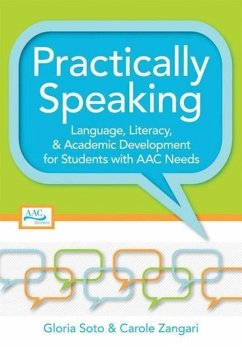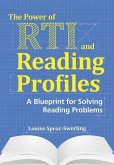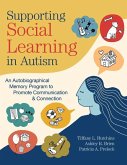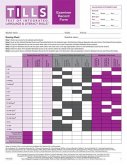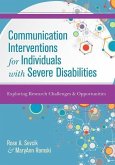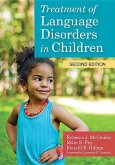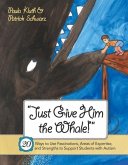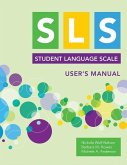Practically Speaking
Language, Literacy, and Academic Development for Students with AAC Needs
Herausgeber: Soto, Gloria; Reichle, Joe; Beukelman, David R; Zangari, Carole
Practically Speaking
Language, Literacy, and Academic Development for Students with AAC Needs
Herausgeber: Soto, Gloria; Reichle, Joe; Beukelman, David R; Zangari, Carole
- Broschiertes Buch
- Merkliste
- Auf die Merkliste
- Bewerten Bewerten
- Teilen
- Produkt teilen
- Produkterinnerung
- Produkterinnerung
This accessible guidebook is every professional's key to helping students develop the language and literacy skills that lead to higher academic achievement and positive peer relationships. Balancing practical strategies with up-to-date research, this book unlocks language and literacy skills for children who use augmentative and alternative communication (AAC) and lays the groundwork for long-term school and social success. Educators and Speech Language Pathologists, (SLP's) who provide communication support will learn to collaborate effectively to improve outcomes for students who use AAC;…mehr
Andere Kunden interessierten sich auch für
![The Power of RTI and Reading Profiles The Power of RTI and Reading Profiles]() Louise Spear-SwerlingThe Power of RTI and Reading Profiles50,99 €
Louise Spear-SwerlingThe Power of RTI and Reading Profiles50,99 €![Supporting Social Learning in Autism Supporting Social Learning in Autism]() Tiffany L HutchinsSupporting Social Learning in Autism55,99 €
Tiffany L HutchinsSupporting Social Learning in Autism55,99 €![Test of Integrated Language and Literacy Skills(tm) (Tills(tm)) Examiner Record Forms Test of Integrated Language and Literacy Skills(tm) (Tills(tm)) Examiner Record Forms]() Nickola NelsonTest of Integrated Language and Literacy Skills(tm) (Tills(tm)) Examiner Record Forms55,99 €
Nickola NelsonTest of Integrated Language and Literacy Skills(tm) (Tills(tm)) Examiner Record Forms55,99 €![Communication Interventions for Individuals with Severe Disabilities: Exploring Research Challenges and Opportunities Communication Interventions for Individuals with Severe Disabilities: Exploring Research Challenges and Opportunities]() Communication Interventions for Individuals with Severe Disabilities: Exploring Research Challenges and Opportunities66,99 €
Communication Interventions for Individuals with Severe Disabilities: Exploring Research Challenges and Opportunities66,99 €![Treatment of Language Disorders in Children ¬With DVD Treatment of Language Disorders in Children ¬With DVD]() Treatment of Language Disorders in Children ¬With DVD82,99 €
Treatment of Language Disorders in Children ¬With DVD82,99 €![Just Give Him the Whale! Just Give Him the Whale!]() Paula KluthJust Give Him the Whale!28,99 €
Paula KluthJust Give Him the Whale!28,99 €![Student Language Scale (Sls) User's Manual Student Language Scale (Sls) User's Manual]() Nickola NelsonStudent Language Scale (Sls) User's Manual55,99 €
Nickola NelsonStudent Language Scale (Sls) User's Manual55,99 €-
-
-
This accessible guidebook is every professional's key to helping students develop the language and literacy skills that lead to higher academic achievement and positive peer relationships. Balancing practical strategies with up-to-date research, this book unlocks language and literacy skills for children who use augmentative and alternative communication (AAC) and lays the groundwork for long-term school and social success. Educators and Speech Language Pathologists, (SLP's) who provide communication support will learn to collaborate effectively to improve outcomes for students who use AAC; determine student needs through effective, ongoing reading, writing, and language assessments; develop IEPs based on each child's language, communication, and literacy goals; help students move beyond emergent literacy and develop the skills research identifies as the keys to reading success; & meet IDEA requirements by adapting the general curriculum so all students participate and achieve.
Hinweis: Dieser Artikel kann nur an eine deutsche Lieferadresse ausgeliefert werden.
Hinweis: Dieser Artikel kann nur an eine deutsche Lieferadresse ausgeliefert werden.
Produktdetails
- Produktdetails
- Verlag: Brookes Publishing Company
- Seitenzahl: 360
- Erscheinungstermin: 22. Januar 2009
- Englisch
- Abmessung: 254mm x 182mm x 19mm
- Gewicht: 621g
- ISBN-13: 9781557669513
- ISBN-10: 1557669511
- Artikelnr.: 25563379
- Herstellerkennzeichnung
- Libri GmbH
- Europaallee 1
- 36244 Bad Hersfeld
- gpsr@libri.de
- Verlag: Brookes Publishing Company
- Seitenzahl: 360
- Erscheinungstermin: 22. Januar 2009
- Englisch
- Abmessung: 254mm x 182mm x 19mm
- Gewicht: 621g
- ISBN-13: 9781557669513
- ISBN-10: 1557669511
- Artikelnr.: 25563379
- Herstellerkennzeichnung
- Libri GmbH
- Europaallee 1
- 36244 Bad Hersfeld
- gpsr@libri.de
Gloria Soto, Ph.D., is a full professor in the Department of Special Education and Communication Disorders at San Francisco State University. She has extensive experience serving students with AAC needs in school settings. Her research areas focus on interventions to support the academic, language, and social development of students with AAC needs in general education classrooms and other school settings. Carole Zangari, Ph.D., CCC-SLP, is a professor of speech, language, and communication disorders in the Fischler School of Education and Human Services at Nova Southeastern University, where she directs the Tyler Institute. Dr. Zangari teaches a variety of AAC classes to master's and doctoral students and to practicing professionals in the postmaster's AAC specialization. In addition to AAC, Dr. Zangari has interests in the area of online teaching and support to families and teams serving children with significant communication difficulties. David R. Beukelman, Ph.D was the Barkley Professor of Communication Disorders at the University of Nebraska-Lincoln, Director of Research and Education of the Communication Disorders Division, Munroe/Meyer Institute of Genetics and Rehabilitation at the University of Nebraska Medical Center, a research partner in the Rehabilitation Engineering and Research Center in Augmentative and Alternative Communication, and a senior researcher in the Institute for Rehabilitation Science and Engineering at the Madonna Rehabilitation Hospital. With Pat Mirenda, he co-authored the textbook, Augmentative and Alternative Communication: Management of Severe Communication Disorders in Children and Adults. He served as editor of the Augmentative and Alternative Communication Journal for four years. Joe Reichle, Ph.D., Professor, Speech-Language-Hearing Sciences, 115 Shevlin Hall, 164 Pillsbury Drive Southeast, University of Minnesota, Minneapolis, Minnesota 55455 Dr. Joe Reichle holds appointments in the Departments of Speech-Language-Hearing Sciences and Educational Psychology at the University of Minnesota. He is an internationally recognized expert in the areas of augmentative communication and communication intervention for persons with significant developmental disabilities and has written over 100 articles and chapters. Dr. Reichle has co-edited 10 books focused on his areas of expertise. He has served as a co-editor of the flagship journal (Journal of Speech-Language-Hearing Research) of the American Speech-Language and Hearing Association. Dr. Reichle was a former Associate Chair of the Department of Speech-Language-Hearing Sciences. During his 33-year career he has served as a PI, co-PI, and investigator on numerous federally funded projects. Currently, he is the Director of the University of Minnesota's Leadership Training Program in Neurodevelopmental Disabilities. Lynn Ahlgrim-Delzell, Ph.D., Dr. Ahlgrim-Delzell's research interests include literacy instruction and assessment and research methods for low-incidence populations. She has over 30 years of experience working with individuals with severe disability in various capacities. Cathy Binger, M.S., CCC-SLP, is a speech-language pathologist and creative writer. She earned her undergraduate degree from The Pennsylvania State University and earned her master's degree from the University of Wyoming. Since graduating, she has worked in hospital, university, and preschool settings, providing services to individuals with communication disabilities, including those who require AAC. In 1994, she returned to The Pennsylvania State University and accepted a job as a research assistant, working with Janice C. Light on a grant to investigate exemplary practices to develop the communicative competence of individuals who use AAC. Cathy Binger currently lives in Laramie, Wyoming, and is writing her first novel. June E. Downing, Ph.D., was a national leader in the field of special education who focused her expertise, time, and energy researching best practices and advocating for individuals with severe and multiple disabilities. She was a steadfast promoter of inclusive education, viewing access to the general education program and peers without disabilities as best practice, as well as an issue of social equality and civil rights. Dr. Downing was an exceptionally productive scholar who published numerous articles, chapters, monographs, and textbooks focusing on the education and inclusion of students with severe and multiple disabilities. Her publications are used by many educators and parents to learn how to provide quality education in inclusive classrooms to students with severe and multiple disabilities. Dr. Downing provided numerous professional development trainings in many regions of the world and served as the keynote speaker at several national and international conferences. She was known for her practical, invigorating, and humorous presentations and workshops. Dr. Downing's career in the field of special education began as a teacher of students with visual impairments and multiple disabilities including deafblindness. She was Associate Professor at the University of Arizona in Tucson and Professor at California State University, Northridge (CSUN). She directed or codirected several federally funded personnel preparation, research-to-practice, and technical assistance projects and was committed to preparing exceptional, highly qualified teachers, whose role she saw as change agents for the future. Through Dr. Downing's teaching and hands-on guidance, her students developed a passion for teaching and a strong commitment to supporting quality lives for students with disabilities and their families. While at CSUN, Dr. Downing contributed to the development of the CHIME Institute's Charter School and was instrumental in its high-quality inclusive educational practices. Dr. Downing served on the National TASH Board of Directors for six years and was Past President of Cal-TASH and AZ-TASH (the California and Arizona state chapters of TASH). She also served as an associate editor of Research and Practices for Persons with Severe Disabilities. Dr. Downing retired from CSUN in 2007 and returned to Tucson, where she lived until her death in July 2011. Her indomitable spirit, passion, and determination have been a driving force in our field, and her work continues to inspire and create positive and successful learning outcomes for students. Karen A. Erickson, Ph.D., David E. and Dolores J. Yoder Distinguished Professor, Director, Center for Literacy and Disability Studies, University of North Carolina at Chapel Hill Karen A. Erickson is Yoder Distinguished Professor and Director of the Center for Literacy and Disability Studies at the University of North Carolina at Chapel Hill. A former teacher of children with significant disabilities, Dr. Erickson's current research addresses literacy and communication assessment and intervention for students with a range of disabilities, including significant disabilities. Dr. Erickson is codeveloper of the Tar Heel Reader online library of accessible books for beginning readers as well as several other assistive, learning, and communication technologies. Beth E. Foley, Ph.D., CCC-SLP, Professor and Head of the Department of Communicative Disorders and Deaf Education, Utah State University For more than 2 decades, Dr. Foleyâ (TM)s career has focused on using assistive technology to improve educational, social, and vocational outcomes for individuals with complex communication needs. Dr. Foley's primary research interests are language and literacy development in children with complex communication needs, and inclusion of students who use AAC in general education settings. Her numerous publications, conference presentations, and workshops on these topics communicate the critical need for integrating best practices in AT/AAC, language, and literacy intervention into educational programming for students with significant disabilities. David A. Koppenhaver, Ph.D., Professor, Department of Reading Education and Special Education, Appalachian State University David A. Koppenhaver is Professor in the Reading Education and Special Education Department at Appalachian State University. His Dr. Koppenhaver's research focuses on literacy in individuals with signifi cant disabilities, including those with complex communication needs. He and David Yoder cofounded the Center for Literacy and Disability Studies at the University of North Carolina at Chapel Hill in 1990. Janice Light, Ph.D., is a Professor in the Department of Communication Disorders at the Pennsylvania State University. She is actively involved in research, personnel preparation, and service delivery in the area of augmentative and alternative communication (AAC). Her primary interest has been furthering understanding of the development of communicative competence and self-determination by individuals who require AAC. Dr. Light is the principal investigator on several federally-funded research grants to improve outcomes for individuals who have significant communication disabilities through the use of augmentative and alternative communication. She is one of the project directors in the Augmentative and Alternative Communication Rehabilitation Engineering Research Center (AAC-RERC), a virtual research consortium funded by the National Institute for Disability and Rehabilitation Research. In 1996, Dr. Light was recognized as the Don Johnston Distinguished Lecturer by the International Society of Augmentative and Alternative Communication for her leadership in the AAC field. In 1999, she received the Dorothy Jones Barnes Outstanding Teaching Award at the Pennsylvania State University. David B. McNaughton, Ph.D., teaches coursework in augmentative communication, assistive technology, and collaboration skills for working with parents and educational team members. He is especially interested in the development and evaluation of online educational materials to build capacity in AAC service delivery. Dr. McNaughton's research interests include literacy instruction for individuals who rely on AAC, and employment supports for individuals with severe disabilities. Krista M. Wilkinson, Ph.D., is a professor at the Pennsylvania State University and Fellow of the American Speech-Language-Hearing Association. She was Editor/Editor-in-Chief of the American Journal of Speech-Language Pathology from 2012-2016. Dr. Wilkinson's current research applies the tools of neuroscience, in particular automated eye tracking technologies, to understand visual and cognitive processing of individuals with severe disabilities, with the goal of using this information to optimize visual augmentative and alternative communication interventions used to support their communication functioning.

